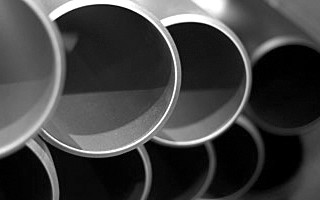NICKEL ALLOY
Nickel Alloys
 Nickel has always been a vital metal for a wide variety of industries for the simple reason that it is a highly versatile material that will alloy with most other metals.
Nickel has always been a vital metal for a wide variety of industries for the simple reason that it is a highly versatile material that will alloy with most other metals.
Both Nickel and nickel alloys are non-ferrous metals with high strength and toughness, superior corrosion resistance, and excellent elevated temperature properties. Pure nickel is a bright silver metallic element of the iron group and is hard, malleable, and ductile. It is also tough and resistant to corrosion and, possibly most importantly of all, it provides an excellent base for developing specialized alloys.
Nickel will alloy easily with many metals, including chromium, iron, molybdenum and copper. This allows for a wide variety of alloys that demonstrate an outstanding of benefits and unique properties.
Its high versatility has led to its use in a diverse range of applications, such as aircraft gas turbines, steam turbines in power plants and its extensive use in the energy and nuclear power markets.
Properties of different Nickel Alloys
Undoubtably, Nickel’s adaptability and natural properties make it a very useful metal. Add to this the large variety of nickel alloys and you get an extremely sought-after material.
When you change the chemical composition of the alloy in question, the benefits change as well, allowing nickel alloys to have a range of commercial uses.
So, what are the properties of nickel and nickel alloys? It is an impressive list of benefits:
-High strength
-Excellent toughness
-Strong temperature strength
-Excellent corrosion resistance in seawater
-Good resistance in hydrofluoric acid
-Nickel alloy levels also present strong weldable properties which means that where welds are used, they have to be able to be extra tough and resilient to fracture even in the face of extreme temperatures.
Of all the nickel alloys out there, Special Piping Materials particularly specialises in two varieties; Inconel Alloy 825, which is made up of approximately 38-46% nickel and Inconel Alloy 625, which consists of 58% nickel.
Special Piping Materials is able to source many different products – such as round bar, flanges or even seamless pipe in both Inconel Alloy 825 or Inconel Alloy 625.
Inconel Alloy 825
This Nickel-iron-chromium alloy which is a nickel-iron-chromium grade with additions of molybdenum copper, and titanium is a high performing alloy. It is highly resistant to corrosion, with the nickel content sufficient for resistance to chloride-ion stress-corrosion cracking. The addition of molybdenum prevents resistance to pitting and crevice corrosion, while the alloy’s chromium content enables resistance to oxidising substances such as nitric acid, nitrates and oxidising salt.
Inconel Alloy 825 can be used in many different applications, such as:
-Fuel element dissolvers
-Sea-water-cooled heat exchangers
-Offshore product piping systems
-Heat exchangers, evaporators, scrubbers, dip pipes
-Air-cooled heat exchangers in petroleum refineries
-Chemical and Food Processing
Inconel Alloy 625
This nickel-chromium-molybdenum-niobium alloy offers the user outstanding corrosion resistance and excellent weldability. The addition of niobium to the alloy delivers high strength but without the need for heat treatment. Like Inconel alloy 825, the high nickel content means that Alloy 625 is immune to chloride-induced stress corrosion cracking. It also has good resistance to pitting and crevice corrosion.
Due to the Inconel Alloy 625’s superior thermal stability, it is often the top choice for those looking for weld overlay applications in the oil and gas, petrochemical and refineries markets.
Inconel Alloy 625 can be used in many different applications, such as:
-Aircraft ducting and exhaust systems
-Engine thrust-reverser systems
-Turbine shroud rings
-Bellows, expansion joints
-Gaskets and damper seals
-Motorsport exhaust and clamps
-Weld overlay and spacers for heat recovery systems
-Furnace muffles
-Valve seats and components
Applications
Nickel alloys are usually most sough-after by industries that need highly durable materials that won’t weaken or perish. Replacement parts can be very expensive and therefore it is in everyone’s best interest to ensure that the first parts supplies are fit-for-purpose and manufactured-to-last.
Nickel and nickel alloys are employed in a wide variety of applications. Some of these include:
-Aircraft gas turbines
-Steam turbine power plants
-Medical applications
-Nuclear power systems
-Chemical and petrochemical industries
-Aerospace parts
-Oil & gas plants
-Defence and power generation industry
-Desalination processing plants
Many of these scenarios require the materials being used to be resistant to both corrosion and heat, hence why nickel and nickel alloy products are ideal.
A specific example is the liquid natural gas industry. It has been established that nickel steel alloys are the most effective in keeping natural gas at very low and vital liquefaction temperatures. It is also important to note that nickel alloys strong weldable properties allow is to withstand temperatures of -196°C, without losing toughness around welded seams. This is an essential ability in the LNG market where natural gas has to be kept at an extremely low temperature to avoid the risk of it become vaporised.
